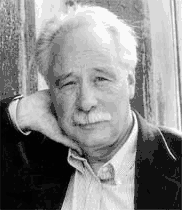Unerzhlt - by W. G. Sebald

OK, we'll come clean here. We're cheating because we wanted to include W. G. Sebald in Alphabeticks but we just couldn't leave out Shakespeare. The German name of one of his earlier books and then again his wife's name is Ute so we could have used that. So, let's forget about Unerzhlt or Ute and concentrate on one of the most extrordinary European authors of the last 25 years - but an author whose first work has only appeared in English as recently as 1996.
Susan Sontag described him as "contemporary master of the literature of lament and mental restlessness". Among his most popular works were "The Rings Of Saturn" in 1998 and "Vertigo" in 1999.
However "Austerlitz", Sebald's final novel, is generally acknowledged to be his greatest work. The story is of a man in his 50s who recovers memories of arriving in Britain from Prague on the Kindertransport. His earlier works are really a trilogy exploring questions of memory, exile and European identity. His poetry "After Nature" and non-fiction "On the Natural History of Destruction", about the Allied fire bombing of German cities, are also now available in English.
Tragically, Sebald was killed age 58 in a car accident in his beloved East Anglia in 2001. Who knows what such a talent could have given the world.
The Holocaust profoundly affected Sebald but he felt that the the official line of mourning and remembering and feel-good sentimental such as Keneally's Schindler's Ark (Schindler's List as a film) were inappropriate to such a profound tradgedy. Instead he wanted to find a literary form that would reflect the echoes of human tragedy which have spread out since his childhood. In the destruction of post-war Germany the causes of the destruction of an entire society were never discussed. Even his father who came home in 1947, after being released from a PoW camp in France, said nothing about the war. Sebald doubted whether those who had never experienced Theresienstadt or Auschwitz could just describe the facts or the sentiment of what occurred there. He found it better to approach the subject obliquely by inventing a new literary form, part hybrid novel, part memoir and part travelogue. He did not feel happy calling these books novels because that implied the need overemphasise the meanings of personal relationships and heavy plots. Instead Sebald writes what he termed 'prose fiction', which takes an oblique look at history by blurring the boundaries between fact and fiction, art and documentary. One minute you are sure you are reading a work of fiction then suddenly you turn the page and there is a photograph of the main character.
That old cliche about not being able to put a book down - it rarely happpens but Sebald's books are strangely compelling and you are soon under his spell.
